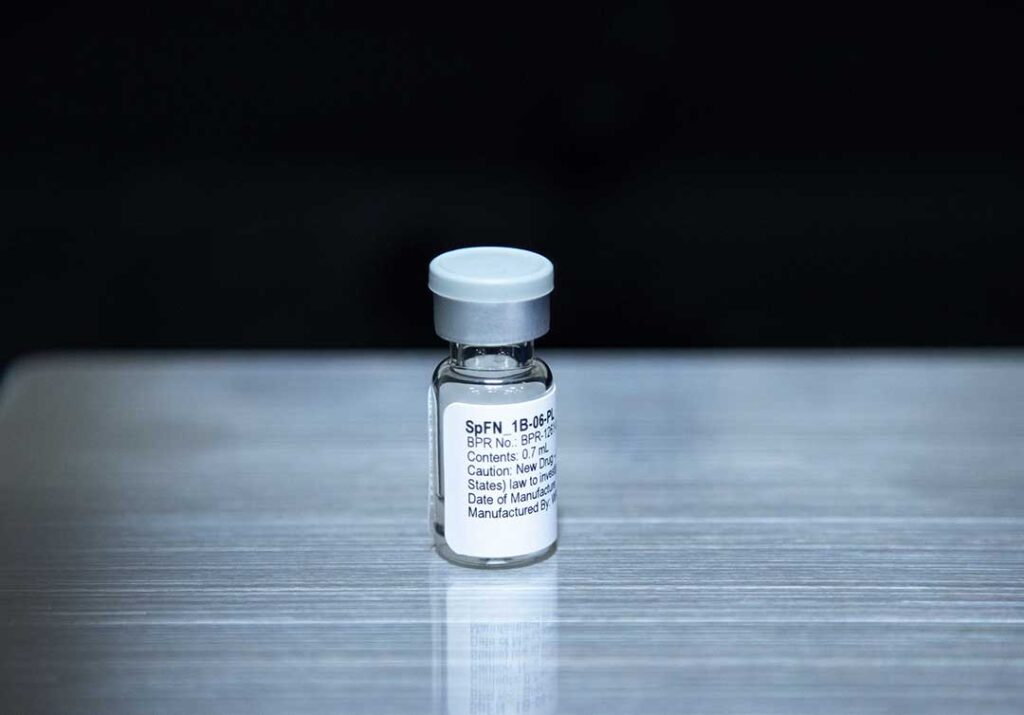THE WATCH STAFF
U.S. Army scientists are expected to announce the development of a breakthrough vaccine engineered to combat current and future variants of the virus that causes COVID-19.
Dr. Kayvon Modjarrad, director of the Emerging Infectious Diseases branch at Walter Reed Army Institute of Research (WRAIR), told the website Defense One on December 22, 2021, that news of an effective vaccine — called a spike ferritin nanoparticle (SpFN) — is expected “within weeks.” (Pictured: The U.S. Army’s SpFN vaccine is considered a breakthrough in the fight against coronavirus variants.)
“The accelerating emergence of human coronaviruses throughout the past two decades and the rise of SARS-CoV-2 variants, including most recently Omicron, underscore the continued need for next-generation preemptive vaccines that confer broad protection against coronavirus diseases,” Modjarrad, who is co-inventor of the vaccine, said in a WRAIRnews release.
SARS-CoV-2 is the coronavirus that causes COVID-19.
The researchers had been tracking the threat posed by new coronaviruses even before the pandemic, according to an April 7 Army Times story on the announcement of clinical testing for the SpFN vaccine.
Modjarrad said that WRAIR’s strategy was to develop a platform that “paves the way for a universal vaccine to protect against not only the current virus, but also counter future variants, stopping them in their tracks before they can cause another pandemic,” according to the Army Times.
Unlike current vaccines, the SpFN uses a “soccer ball-shaped protein with 24 faces for its vaccine, which allows scientists to attach the spikes of multiple coronavirus strains on different faces of the protein,” according to the Defense One story.
The vaccine’s initial trials in primates generated strong antibody responses that protected against the SARS-CoV-2 strain as well as variants and even other coronaviruses, such as the SARS-CoV-1 virus that spread worldwide in the early 2000s, according to a December 2021 study published in the journal Science Translational Medicine.
The first human trials began in April, WRAIR said in its news release. Modjarrad told Defense One the trial tested the vaccine on people who hadn’t been vaccinated and had not previously contracted COVID-19, and results are undergoing a final review before publication.
The vaccine can also be stored at a range of temperatures, which could make it easier for global distribution, WRAIR said in the news release.
The next trial in development of SpFN will look at how the vaccine works in people who have previously received a vaccine or been infected with the virus, Modjarrad told Defense One.
The efficacy of current vaccines has waned with the emergence of new variants such as delta and omicron.
“The threat from COVID-19 continues as it evolves, and eventually there will be other emerging disease threats,” Dr. Nelson Michael, director of the Center for Infectious Diseases Research at WRAIR, said in the news release. “Our investment in developing a next generation vaccine is an important step towards getting ahead of COVID-19 and future disease threats.”
IMAGE CREDIT: MIKE WALTERS/U.S. ARMY

